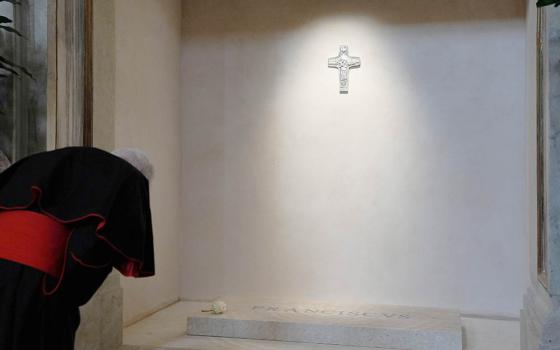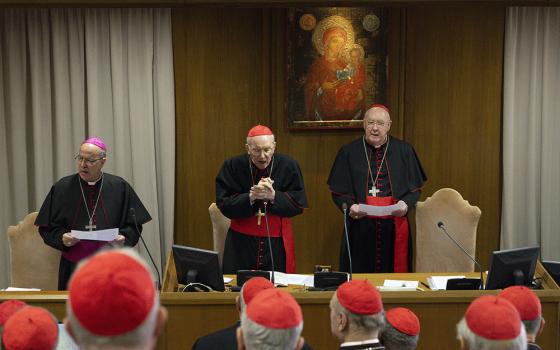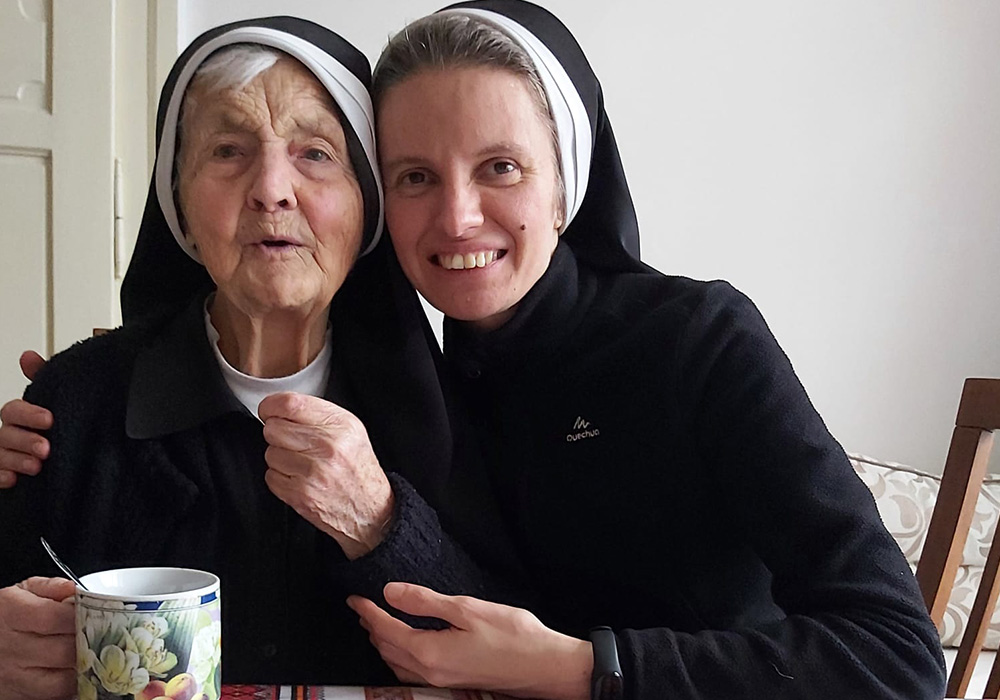
Sr. Olha Ladzhun, left, and Sr. Emanujila Vishka are pictured in a photo taken in January 2024. (Courtesy of Emanujila Vishka)
It is not rare among religious women to live more than a century. They usually impress younger members of their communities by their mostly turbulent and dynamic lives and by their passionate desire to live their lives well. If this statement is true about any place in the world, the intensity of challenges grow in exponential proportion if a person was lucky (or doomed) to be born in what Timothy Snyder calls "bloodlands," a region comprising modern-day Poland, Ukraine, Belarus, Russia and the Baltic states.
Sr. Olha Ladzhun, a 105-year-old Basilian sister has lived for one century with the Basilian Sisters, which makes her unique. She was born in Rus'ki Komarivtsi not far away from Uzhhorod in Transcarpathia. During the years of her life, this region passed from one regime to another, being a part of several different countries (including Czechoslovakia, Hungary, the Soviet Union and Ukraine). As a child, Sister Olha (then Maria) had lost her father in World War I and at the age of 5, together with her older sister Yelisaveta, was brought to the orphanage of Basilian Sisters in Uzhhorod.
Small Maria, belonging to the highest risk survival groups of her time, an orphan Ukrainian girl in the Eastern Catholic Church in Transcarpathia and a Basilian sister of the underground church in the communist regime of the Soviet Union, had a tiny probability of survival at all. Yet, she survived in the difficult conditions of war time, graduated from a pedagogical female seminary in Uzhhorod, and later studied biology in the University of Szeged (Hungary). She became a Basilian sister and a biology teacher, a spiritual mother for many faithful. She outlived Stalin and Hitler. Hopefully, she will also see the fall of Putin's regime.
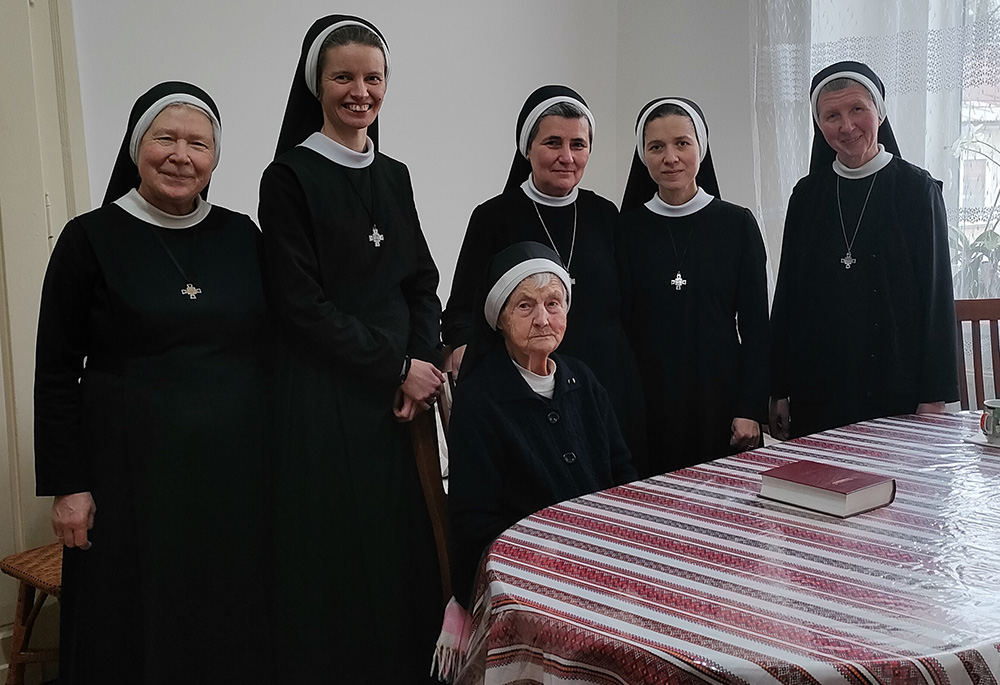
Sr. Olha Ladzhun, seated, is pictured with members of the Basilian community in Khust, Ukraine, along with members of the general leadership team in January 2024. (Courtesy of Emanujila Vishka)
Her life is not only about survival. It is about deep Christian and consecrated life and love towards children and young people and all who are vulnerable and persecuted. Sister Olha continues to live a conscious life of preserving and cultivating the identity of her people in spite of fierce forces that tried to steal it from her and many others.
She is a living testimony of a turbulent 20th century in the part of the world called "bloodlands" and of a quarter of the 21st century that does not promise to be easier. Visiting Sr. Olha Ladzhun in January 2024, I was impressed by her ability to live the normal life of a sister. She comes for prayers, reads without glasses and sings distinctively and wholeheartedly, then serves herself the same breakfast as any other member of the community. She uses a wheelchair, but walks when someone accompanies her.
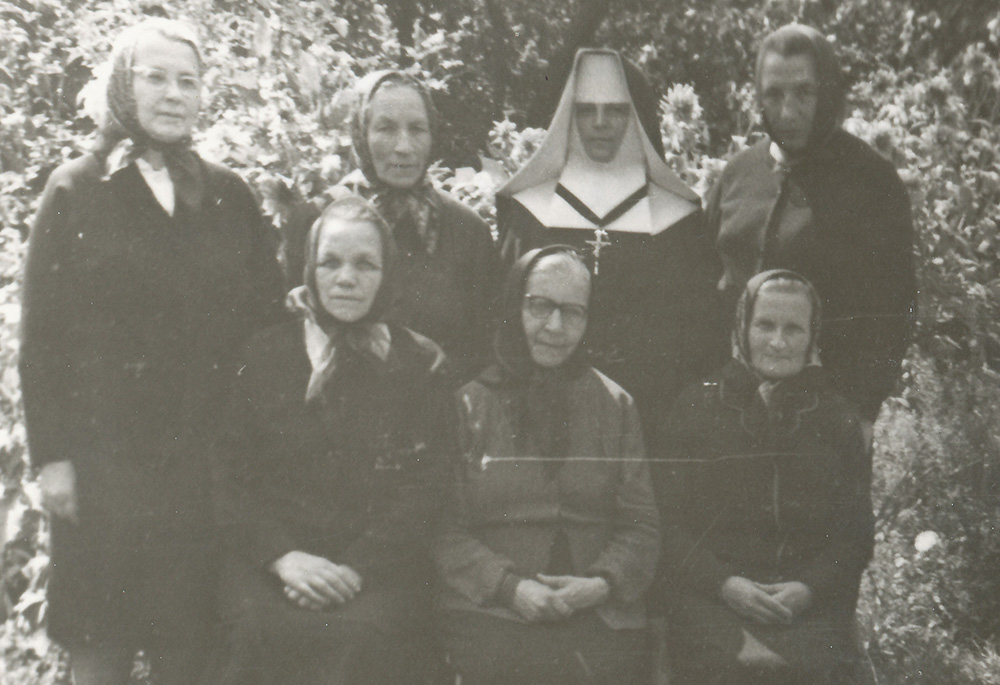
Sr. Olha Ladzhun, first on the left, is pictured at the 1974 final vows of Sr. Julianna Dzhuhan (Courtesy of the Basilian Sisters of the Most Holy Trinity Province, Ukraine)
Sister Olha is a person with many bright memories, some of which are very sad and dramatic, as life was somehow constantly challenging her to grow, to go deeper and further. Teaching biology and giving her love to the youngest, while staying faithful to her vocation, despite persecutions and suppression from the communist regime, led Sister Olha to transform into a praying, healing and life-giving presence in the world.
There is no need to idealize Sister Olha because of her age or her story. She is still in the process of learning, and God still has plans for her. I can share my vision of her mission today. She is a surviving eyewitness of countless disasters and blessings in Transcarpathia, Ukraine and the bloodlands. Her life itself serves as a focal point, collecting the stories of her people into one narrative.
Advertisement
Now she lives in the Basilian community in Khust, in a caring and loving environment. Sister Olha appreciates it, and as I have heard her repeat several times, "How kind are the people I am living with now."
Listening to her kind voice and noticing her manner of expressing her thoughts, I know that this is my opportunity to get a glimpse into an era I know only from books and movies.
What I learn from the example of her life might be that the cruel powers of this world always pass, but love will stay forever.





